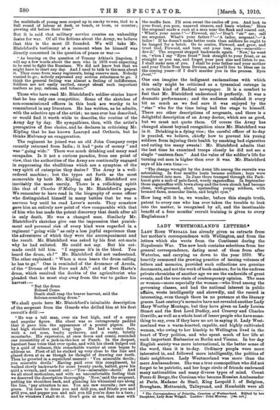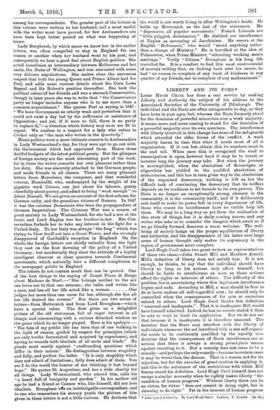LADY WESTMORLAND'S LETTERS.*
LADY ROSE WEIGALL has already given us extracts from her mother's correspondence with Wellington, and from the letters which she wrote from the Continent during the Napoleonic War. The new book contains selections from her general correspondence, dating most of them from after Waterloo, and carrying us down to the year 1870. We heartily commend the growing practice of issuing volumes of letters and memoirs, provided such collections are genuine documents, and not the work of book-makers; for in the undress private chronicles of another age we see the underside of great events, and the true state of contemporary opinion. The man or woman—more especially the woman—who lived among the governing classes, and had the national interest in public affairs, wrote intelligently and shrewdly, and the record is interesting, even though there be no pretence at the literary graces. Last century's memoirs have not revealed another Lady Mary Wortley Montagu, but they have given us Lady Louisa Stuart and the first Lord Dudley, and Creevey and Charles Greville, as well as a whole host of lesser people who have some- thing to say, even if they have no art in saying it. Lady West- morland was a warm-hearted, capable, and highly cultivated woman, who owing to her kinship to Wellington lived in the heart of Tory politics, and who spent much of her life at such important Embassies as Berlin and Vienna. In her day English society was more international, in the better sense of the word, than it is to-day. Ordinary people were more interested in, and followed more intelligently, the politics of their neighbours. Lady Westmorland was more than the mere Ambassadress. She was a true cosmopolitan who did not forget to be patriotic, and her huge circle of friends embraced many nationalities and many diverse types of mind. Count Pozzo di Borgo, the Corsican who became Russian Ambassador at Paris, Madame de Stael, King Leopold I. of Belgium, Brougham, Metternich, Talleyrand, and Humboldt were all • The Correspondents of Priscilla, Countess of Westmorland. Edited by her Daughter, Lady Rose Weigel'. London : John Murray. 1.14e. net.]
among her correspondents. The greater part of the letters in this volume were written to her husband, and a most useful wife the writer must have proved, for few Ambassadors can have been kept better posted on what was happening at home.
Lady Burghersh, by which name we know her in the earlier letters, was often compelled to stay in England for one reason or another when her husband went to his post, and consequently we hear a good deal about English politics. She acted sometimes as intermediary between Melbourne and her uncle, the Duke of Wellington, and was entrusted with some very delicate negotiations. She makes clear the enormous respect that both the young Queen and Prince Albert had for Peel, and adds some curious details about the Corn Laws Repeal and Sir Robert's position thereafter. She took the political colour of her friends and was a staunch Conservative, though in later years she was to write that "the Conservative party no longer includes anyone who is to me more than a common acquaintance." She quotes Peel as saying in 1847 : " We have Government so utterly weak and powerless that it could not exist a day but by the sufferance or assistance of Opposition ; and yet, if it were to fall, there is no party to replace it,"—a situation which history may soon see fit to repeat. We confess to a respect for a lady who refers to Croker only as "the man who writes in the Quarterly."
Home politics were a more intimate concern to Ambassadors in Lady Westmorland's day, for they were apt to go out with the Government which had appointed them. Hence these dutiful budgets of the latest political gossip. But the glimpses of foreign society are the most interesting part of the book, for in these the writer consults her own pleasure rather than her duty. She was sincerely attached to the German people, and made friends in all classes. There are many pleasant letters from Meyerbeer, the composer, and that wonderful veteran, Humboldt, who, undismayed by the weight of his gigantic work Cosmos, can jest about his labours, gossip cheerfully about poetry, and admit to being " weak enough " to detest Disraeli. We are given an account of the first scheme for German unity, and the grandiose visions of Bunsen. In 1847 it was the extreme Democrats who were the propagandists of German Imperialism. The Crimean War was a season of great anxiety to Lady Westmorland, for she had a son at the front, and Lord Raglan was her brother-in-law. Her Con- servatism forbade her to take any interest in the fight for a United Italy. To her Italy was always "the frog " which was trying to blow itself out into a Great Power, and she strongly disapproved of Garibaldi's reception in England. On the whole, the foreign letters are chiefly valuable from the light they cast on the first dawning of the policy of a United Germany ; but incidentally they show the attitude of a highly intelligent observer at close quarters towards Continental movements, which naturally bore a different complexion to the newspaper public in England.
The letters do not contain much that can be quoted. One of the best things is the saying of Count Pozzo di Borgo about Madame de Steel :—" She belongs neither to the sex one loves nor to that one esteems ; she talks and writes like
a man, and has all her life acted like a woman One judges her more than one cares for her, although she has all her life desired the reverse." But there are two series of letters—from Metternich and from Lord Brougham—which have a special value. The first gives us a delightful picture of the old statesman, full of eager interest in all things, and commenting with a curious detached wisdom on the game which he no longer played. Here is his apologia :- " The fate of my public life has been that of one walking in the light of reason, guided by respect for principles (which are only truths formulated and acquired by experience), and having to wrestle with idealists of all sorts and kinds." He pleads most sanely against " confounding questions which differ in their nature." He distinguishes between stupidity and folly, and prefers the latter. "It is only stupidity which does not admit of limitations ; folly does admit of them. You see I do the world the honour of not thinking it lost beyond hope." He quotes St. Augustine, and has a wide charity for all things. Lady Westmorland, who adored him, calls his " a heart full of benignity and pardon." In his mellow old age he had a friend at Cannes who, like himself, did not love idealists. Brougham vaigs an indefatigable correspondent, and to one who remembers his stormy youth the picture of him given in these letters is not a little curious. He declares that
the world is not worth living in after Wellington's death. He holds up Metternich as the last of the statesmen. He " deprecates all popular movements." French Liberals are "little priggish doctrinaires." He disliked our interference at Naples as savouring of Jacobinism. He sneers at the English "Reformers," who would "stand anything rather than a change of Ministry." He is horrified at the idea of Palmerston, when Prime Minister, "attending working men's meetings." Verily "Citizen" Brougham in his long life travelled far. It is a comfort to find this most controversial of mortals writing that, on looking back over his career, he had " no reason to complain of any want of kindness in any quarter of my friends, nor to complain of any maltreatment."















































 Previous page
Previous page